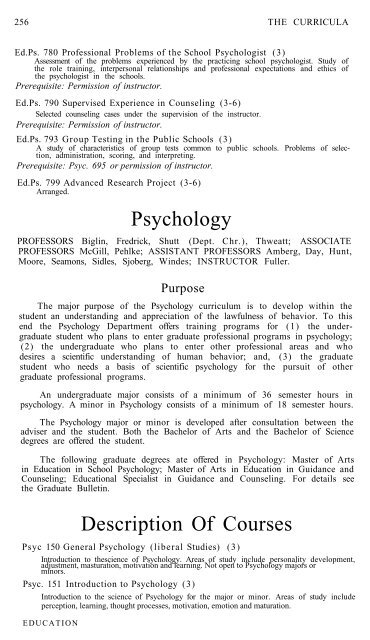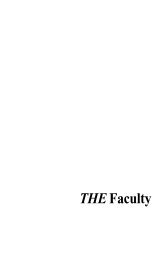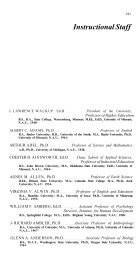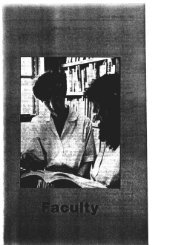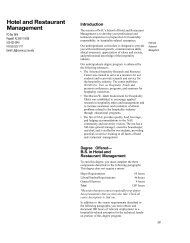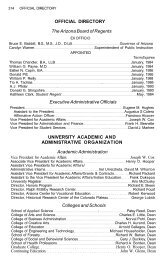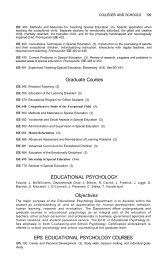Psychology Description Of Courses
Psychology Description Of Courses
Psychology Description Of Courses
You also want an ePaper? Increase the reach of your titles
YUMPU automatically turns print PDFs into web optimized ePapers that Google loves.
256 THE CURRICULA<br />
Ed.Ps. 780 Professional Problems of the School Psychologist (3)<br />
Assessment of the problems experienced by the practicing school psychologist. Study of<br />
the role training, interpersonal relationships and professional expectations and ethics of<br />
the psychologist in the schools.<br />
Prerequisite: Permission of instructor.<br />
Ed.Ps. 790 Supervised Experience in Counseling (3-6)<br />
Selected counseling cases under the supervision of the instructor.<br />
Prerequisite: Permission of instructor.<br />
Ed.Ps. 793 Group Testing in the Public Schools (3)<br />
A study of characteristics of group tests common to public schools. Problems of selection,<br />
administration, scoring, and interpreting.<br />
Prerequisite: Psyc. 695 or permission of instructor.<br />
Ed.Ps. 799 Advanced Research Project (3-6)<br />
Arranged.<br />
<strong>Psychology</strong><br />
PROFESSORS Biglin, Fredrick, Shutt (Dept. Chr.), Thweatt; ASSOCIATE<br />
PROFESSORS McGill, Pehlke; ASSISTANT PROFESSORS Amberg, Day, Hunt,<br />
Moore, Seamons, Sidles, Sjoberg, Windes; INSTRUCTOR Fuller.<br />
Purpose<br />
The major purpose of the <strong>Psychology</strong> curriculum is to develop within the<br />
student an understanding and appreciation of the lawfulness of behavior. To this<br />
end the <strong>Psychology</strong> Department offers training programs for (1) the undergraduate<br />
student who plans to enter graduate professional programs in psychology;<br />
(2) the undergraduate who plans to enter other professional areas and who<br />
desires a scientific understanding of human behavior; and, (3) the graduate<br />
student who needs a basis of scientific psychology for the pursuit of other<br />
graduate professional programs.<br />
An undergraduate major consists of a minimum of 36 semester hours in<br />
psychology. A minor in <strong>Psychology</strong> consists of a minimum of 18 semester hours.<br />
The <strong>Psychology</strong> major or minor is developed after consultation between the<br />
adviser and the student. Both the Bachelor of Arts and the Bachelor of Science<br />
degrees are offered the student.<br />
The following graduate degrees ate offered in <strong>Psychology</strong>: Master of Arts<br />
in Education in School <strong>Psychology</strong>; Master of Arts in Education in Guidance and<br />
Counseling; Educational Specialist in Guidance and Counseling. For details see<br />
the Graduate Bulletin.<br />
<strong>Description</strong> <strong>Of</strong> <strong>Courses</strong><br />
Psyc 150 General <strong>Psychology</strong> (liberal Studies) (3)<br />
Introduction to thescience of <strong>Psychology</strong>. Areas of study include personality development,<br />
adjustment, masturation, motivation and learning. Not open to <strong>Psychology</strong> majors or<br />
minors.<br />
Psyc. 151 Introduction to <strong>Psychology</strong> (3)<br />
Introduction to the science of <strong>Psychology</strong> for the major or minor. Areas of study include<br />
perception, learning, thought processes, motivation, emotion and maturation.<br />
EDUCATION
THE CURRICULA 257<br />
Psyc. 200 Analysis of Behavior (3)<br />
Analysis of the methods, principles and concepts which relate learning to behavior.<br />
Prerequisite: Psyc. 151 or equivalent.<br />
Psyc. 245 Psychological Statistics (3)<br />
Study of the basic elements of research design, collection, treatment and interpretation of<br />
psychological data. Introduction to descriptive statistics and inferential theory.<br />
Psyc. 250 Experimental <strong>Psychology</strong> (3)<br />
Laboratory course dealing with procedures and techniques for the study of behavior.<br />
Prerequisites: Psyc. 151 and 245.<br />
Psyc. 255 Physiological <strong>Psychology</strong> (3)<br />
Study of the physiological and neurological bases of behavior.<br />
Prerequisites: Psyc. 151 and 4 hours of Biol.<br />
Psyc. 275 Dynamics of Behavior (3)<br />
Examination of the dynamics of personality development, growth and deterioration.<br />
Emphasis is placed upon the principles of motivation, maturational processes, anxiety<br />
defenses and psychopathology.<br />
Prerequisite: Psyc. 151 or equivalent.<br />
Psyc. 300 Human Learning (3)<br />
Laboratory course dealing with experimentally established behavior principles of complex<br />
human learning.<br />
Prerequisite: Psyc. 250.<br />
Psyc. 310 Sensation and Perception (3)<br />
Laboratory course dealing with the sensory and perceptual bases of behavior.<br />
Prerequisites: Psyc. 250 and 255.<br />
Psyc. 315 Motivation and Emotion (3)<br />
A laboratory course dealing with physiological bases of motivation and emotion.<br />
Prerequisites: Psyc. 250 and 255.<br />
Psyc. 335 Social <strong>Psychology</strong> (3)<br />
Study of social and group factors affecting individual behavior. Introduction to group<br />
dynamics.<br />
Prerequisite: Psyc. 151 or equivalent.<br />
Psyc. 340 Developmental <strong>Psychology</strong> (3)<br />
Study of the development and behavioral characteristics of the human from infancy through<br />
the senile years.<br />
Prerequisite: Psyc. 151 or equivalent.<br />
Psyc. 346 Industrial <strong>Psychology</strong> (3)<br />
Study of the psychological aspects of the problems in industry, including selection,<br />
training and placement of personnel. Introduction to human factor concepts, motivation,<br />
leadership styles and organizational theory.<br />
Prerequisite: Psyc. 151 or equivalent.<br />
Psyc 347 Personnel <strong>Psychology</strong> (3)<br />
A study of the application of psychological principles and method) to problems of<br />
business and government. Includes concepts of selection, placement, training and<br />
evaluation of personnel.<br />
Prerequisite: Psyc. 346.<br />
Psyc 380 Psychological Testing (3)<br />
Analysis of test theory and construction with a qitical study of contemporary psychological<br />
assessment techniques in intelligence, aptitude, interest and personality reasurement.<br />
Prerequisites: Psyc. 151 and 245.<br />
EDUCATION
EDUCATION<br />
258 THE CURRICULA<br />
Psyc. 400 History of <strong>Psychology</strong> (3)<br />
Analysis of the emergence of psychological concepts in the history of Western civilization<br />
and the philosophical background of current issues in psychology.<br />
Prerequisite: Psyc. 151 or equivalent.<br />
Psyc. 410 Systems of <strong>Psychology</strong> (3)<br />
A study of the development of the contemporary systems and theories in psychology.<br />
Prerequisite: Psyc. 151 or equivalent.<br />
Psyc. 460 Readings in <strong>Psychology</strong> (3)<br />
Independent study in depth of some psychological area culminating in a critical research<br />
paper in the area of concern.<br />
Prerequisite: Permission of instructor.<br />
Psyc. 494 Comparative <strong>Psychology</strong> (3)<br />
Laboratory course dealing with the comparative study of animal behavior. Investigation<br />
of behavioral phenomena found in selected animals.<br />
Prerequisites: Psyc. 250 and 255.<br />
Psyc. 495H Principles of Behavior (3)<br />
An analysis of psychology as a science of behavior with emphasis upon experimental<br />
findings. Not open to psychology majors or minors.<br />
Prerequisite: Permission of Honor's Council.<br />
Psyc. 496 Principles of Leadership in Organizations (3)<br />
Study of group dynamics, general systems theory, motivational theory and leadership styles.<br />
Prerequisite: Psyc. 346.<br />
Graduate <strong>Courses</strong><br />
Psyc. 500 Abnormal <strong>Psychology</strong> (3)<br />
Investigation of the antecedents, symptomatology and treatment procedures dealing with<br />
organic and functional behavioral disorders.<br />
Prerequisites: Psyc. 275 and permission of instructor.<br />
Psyc. 501 Introduction to Clinical <strong>Psychology</strong> (3)<br />
Introductory study of the clinical methods used in the diagnosis and treatment of emotional<br />
problems including basic projective theory and interview techniques.<br />
Prerequisite: Psyc. 500.<br />
Psyc. 510 Theories of Personality (3)<br />
Critical investigation of the historical and contemporary concepts in personality theory.<br />
Includes the study of theory formation and psychoanalytical, organismic and behavioral<br />
personality theories.<br />
Prerequisites: Psyc. 275 and permission of instructor.<br />
Psyc 520 Theories of Learning (3 )<br />
Comprehensive study of the major theories of learning, including those of historical<br />
importance and those prominent in contemporary psychology.<br />
Prerequisites: Psyc. 300 and permission of instructor.<br />
Psyc 525 Advanced Psychological Statistics (3)<br />
Study of advanced descriptive and inferential statistics, including analysis of variance,<br />
covariance and advanced correlational analysis.<br />
Prerequisite: Psyc. 245.<br />
Psyc 530 Advanced Experimental <strong>Psychology</strong> (3)<br />
Laboratory course dealing with complex research design and advanced techniques for<br />
behavioral analysts.<br />
Prerequisites: Psyc. 250, 525 and permission of instructor.
THE CURRICULA 259<br />
Psyc. 670 Current Issues in Psychological Measurement (3)<br />
Critical investigation of contemporary issues in psychology. Evaluation of current research<br />
in selected areas of psychology.<br />
Psyc. 682 Advanced Behavior Theory (3)<br />
The theory and application of behavior modification principles to the solution of learning<br />
and behavior problems.<br />
Prerequisite: Permission of instructor.<br />
Psyc. 683 Advanced Psychopathology (3)<br />
Advanced study of the concepts of abnormality in behavior systems.<br />
Prerequisites: Psyc. 500, Psyc. 501 and permission of instructor.<br />
Psyc. 684 Motivation and Personality Seminar (3)<br />
Critical evaluation of contemporary theories of motivation and personality.<br />
Prerequisites: Psyc. 510 and permission of instructor.<br />
Psyc. 691 Seminar in Developmental <strong>Psychology</strong> (3)<br />
Critical analysis of the concepts, theories and issues in the development of the human<br />
organism. Investigation of the major behavioral variables influencing man's development<br />
from the prenatal period to senility.<br />
Prerequisite: Psyc. 340.<br />
Psyc. 737 Psychodiagnostics 1(3)<br />
Introduction to the clinical interview and projective psychology. Emphasis placed on<br />
thematic apperceptive concepts.<br />
Prerequisites: Psyc. 501, Ed.Ps. 730 and permission of instructor.<br />
Psyc. 738 Psychodiagnostics II (3)<br />
Study of the Rorschach and other ink blot techniques in the psychodiagnostic procedure.<br />
Prerequisites: Psyc. 737 and permission of instructor.<br />
Psyc. 739 Psychodiagnostic Practicum (3-6)<br />
Supervised experience in a clinical setting. The student will assume responsibility, under<br />
supervision, for a clinical case from initial contact through staffing, treatment and<br />
follow-up. Course can be repeated up to 6 semester hours.<br />
Prerequisites: Psyc. 737 and permission of instructor.<br />
Psyc 753 Neurological Assessment (3)<br />
Study of psychological techniques in evaluation and diagnosis of organic and perceptual<br />
dysfunction.<br />
Prerequisites: Psyc. 738 and permission of instructor.<br />
Psyc 796 Statistics II: Application and Interpretation of Statistical<br />
Problems (3)<br />
Advanced study of inferential statistics including statistical design of psychological<br />
research.<br />
Prerequisites: 695 and permission of instructor.<br />
Psyc 797 Computer Statistics (3)<br />
Computer applications in descriptive and inferential statistics. Designed to give the<br />
graduate students in psychology minimum practice in programming research projects.<br />
GRADUATE MINOR IN PSYCHOLOGY<br />
By special permission of the Graduate Dean and upon recommendation of the<br />
Dean of the College of Education, students may be permitted to minor in <strong>Psychology</strong><br />
at the graduate level.<br />
EDUCATION
260 THE CURRICULA<br />
LIBRARY COURSES<br />
The area of library service has as its purpose to provide training leading to<br />
certification of teachers in Library Science. Specific professional preparation is<br />
required for all librarians working in the public schools. The latest manual explain,<br />
ing the requirements for certification for librarians should be examined by any<br />
school librarian interested in meeting the latest requirements. Such a manual is<br />
available from the Superintendent of Public Instruction.<br />
Undergraduate courses to be given during regular school session.<br />
US. 300 Library Practice (2)<br />
A library coarse designed to aid the teacher who has charge of a school library.<br />
LS. 301 Library Service to Children and Adolescents (2)<br />
Management of elementary, junior and senior high school libraries.<br />
Educ. 302 Children's Literature (2)<br />
Literature for children as the basis for the appreciation, selection and presentation<br />
of the most suitable stories for kindergarten and elementary grades.<br />
LS. 302 Introduction to Classification and Cataloging (2)<br />
A consideration of efficient means of arrangement and processing of books in small<br />
libraries, elementary and secondary.<br />
L.S. 303 Introduction to Reference Materials (2)<br />
A study of basic reference materials and their use for students and teachers.<br />
Graduate <strong>Courses</strong><br />
L.S. 500 Introduction to School Library Materials (3)<br />
To provide the teacher or school librarian with an understanding of and an appreciation<br />
for the materials which the school library should provide.<br />
LS. 501 Reference and Bibliography (3)<br />
A survey of reference books and bibliographies in smaller libraries for reference work,<br />
book selection and ordering.<br />
LS. 502 Cataloging and Classification (3)<br />
Principles of classifying books in the smaller libraries by means of the Dewey Decimal<br />
Classification and a study of Library of Congress and Wilson card arrangement in<br />
drawing the card catalog and the shelf list.<br />
L.S. 508 Problems of Teaching Literature in the Intermediate and<br />
Upper Elementary Grades (3)<br />
See Educ. 508.<br />
LS. 529 Literature for Adolescents (2)<br />
See Eng. 529.<br />
LS. 600 Administration and Organization of School Libraries (3)<br />
Includes a study of the functions functions, organization, control, and equipment of the school<br />
library; the relation of the librarian to the administration and to the instructional<br />
program of the school.<br />
LS. 601 Principles of Book Selection (3)<br />
A study of the chief aids in selecting books for all types of libraries; a comparison<br />
of editions and translations; and a critical consideration of reviews.<br />
LS. 602 Teaching the Use of the Library (3)<br />
Methods and devices in teaching children from the early grades' through high school<br />
how to make use of the library.<br />
EDUCATION


